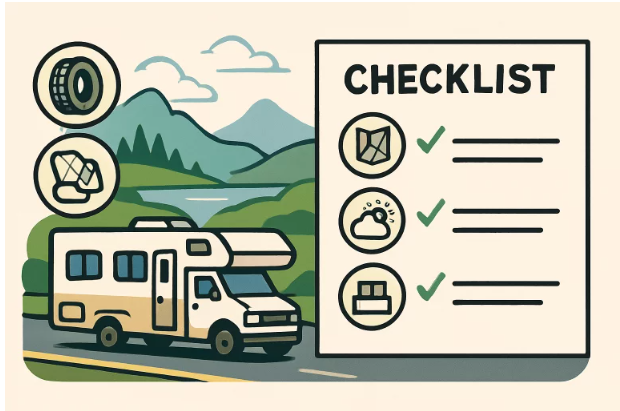Planning a successful road trip in an RV or camper requires more than just picking a destination—it involves thoughtful preparation and attention to detail. Before hitting the road, it’s crucial to inspect essential systems like brakes, tires, plumbing, and electrical components to avoid disruptions during your travels. Keeping basic tools, spare parts, and emergency supplies on hand ensures you’re ready for minor repairs or unexpected situations. If issues arise, having access to trusted services like RV repairs Minnesota can offer peace of mind and practical support, no matter where your journey takes you. A well-prepared approach helps prevent delays and makes the experience safer and more enjoyable, allowing travelers to focus on the adventure ahead rather than potential setbacks.
Practice Driving and Parking
Driving an RV or camper is different from maneuvering a standard passenger car. Many newcomers underestimate the learning curve until they face sharp corners, tight campgrounds, or crowded service stations. Spend dedicated time in an empty parking lot practicing wide turns, reversing, and close-quarter movements—essential maneuvers for any trip. This training is about more than just technique; it builds your confidence, increases your reaction time, and helps you understand your vehicle’s height, length, and blind spots. Knowing exactly how your RV responds to steering and braking reduces anxiety and mitigates avoidable mishaps.
Plan Your Route
Meticulous route planning is key for a stress-free RV journey. RVs face challenges like bridge height limits and weight restrictions, unlike standard vehicles. Regular GPS can be risky, so use dedicated RV navigation tools, considering your vehicle’s dimensions. Before departure, list RV-friendly campgrounds and rest areas and plan fuel and grocery stops while allowing for flexibility in case of detours or construction. A carefully planned route minimizes surprises and enhances both relaxation and exploration.
Regular Maintenance
The long-term health of your RV relies on regular inspections and maintenance. Before each trip, use a checklist to check tire wear and air pressure, inspect brakes, lights, and fluid levels (engine oil, coolant, generator fuel), assess HVAC, batteries, propane tanks, and water or sewage systems to ensure they function correctly, and address minor warning signs promptly to avoid expensive repairs later. Preventive maintenance with trusted professionals is usually more affordable and less disruptive than emergency fixes.
Weight Distribution
Proper weight distribution in your RV is essential for safety and longevity. Load heavier items low and centered to maintain stability and reduce rollover risks. Uneven loading can affect steering and braking, leading to tire or axle wear. Know your RV’s Gross Vehicle Weight Rating (GVWR) and follow manufacturer guidelines for towing and carrying. During multi-stop trips, regularly check your load as supplies change.
Weather Awareness
Weather significantly impacts RV travel and can change unexpectedly. Severe conditions like high winds, heavy rain, or snow can make roads and campgrounds unsafe, while extreme heat can stress cooling systems. Use reliable weather apps to stay updated on conditions for your route and destinations. Have an emergency plan with alternate roads and safe spots, and don’t hesitate to pause your journey if necessary. Being weather-aware means being flexible; sometimes, waiting out a storm in a secure location is wise. For comprehensive safety tips, check out RV Life for practical advice for RV travelers.
Campground Etiquette
Harmonious campground experiences depend on good manners and respect for communal spaces. Check in upon arrival and familiarize yourself with the quiet hours, pets, fires, and waste disposal rules. Clean up, keep belongings within your spot, and minimize noise to maintain a peaceful environment. Teach children to respect boundaries and property. Proper waste management is essential—dispose of grey water and trash, recycle correctly, and leave your site better than you found. Practicing these courtesies ensures a pleasant stay and fosters goodwill among travelers.

